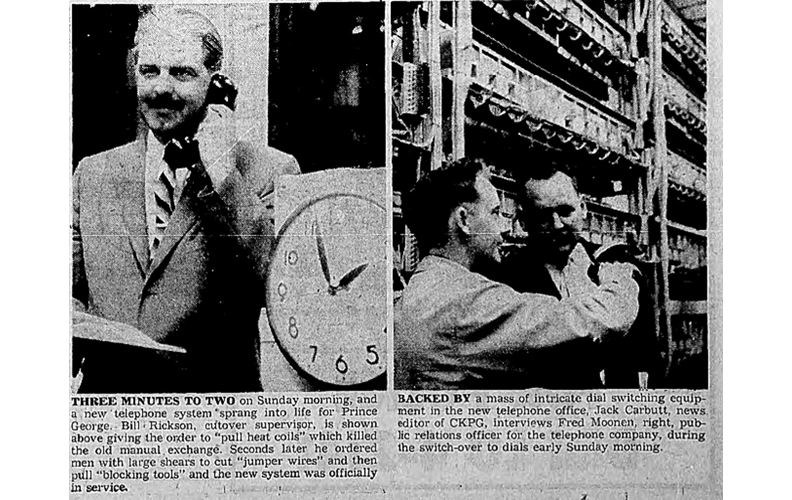This week in Prince George history, March 4 to March 10:
March 10, 1958: Staff of the Northwest Telephone Company were preparing to bring Prince George into a new age of telecommunication technology.
"Dial tone will replace the familiar 'number please' in the Prince George telephone exchange at 2 a.m. Sunday, March 30, (1958)," The Citizen reported. "At this moment the existing manual system will be switched over to automatic operation. Northwest Telephone Company officials expect that the actual cutover will take less than two minutes to complete -a brief finale to the months of planning and hard work that has been spent in bringing dial service to Prince George."
The conversion was expected to affect approximately 4,500 telephones, making it the largest switch to dial tone in the company's history.
"The new automatic equipment is being installed parallel to the old system and it will only be matter of killing the old and activating the new," Northwest Telephone Company manager C.J. McLean said.
Staff at the telephone building on Sixth Avenue were busying installing, testing and training to use the new equipment. The switch required the installation of new phones, cable and distribution wire.
"Dial service will not mean the complete absence of operators. Subscribers will still call on the switchboard staff when placing long distance calls, when in need of assistance in placing a call or when calling for information," The Citizen reported.
(ITALIC) The March 31, 1958 Citizen reported on the successful switch to a dial tone system: (END ITALIC)
"About 4,500 new automatic telephones came into use at cutover time, 2 a.m. Sunday, but for approximately 25 seconds after the switch, stricken looks came over the faces of the men in charge," The Citizen reported. "According to one veteran telephone man, it was the first conversion he remembered where there was no one using the dial phones at the cutover time. The dead silence of the switches caused sinking hearts until the first call went through, and the men knew the $1,000,000 installation was okay."
The old system was shut off at 1:57 a.m. and 90 seconds later the new system was online, confounding those who'd waited for 2 a.m. to try to be the first caller.
Technicians began immediately testing all the lines to check for a dial tone and "later in the morning, (a) battery of girls started to call all the telephones in the exchange to see that they were ringing properly," The Citizen reported.
One of the biggest problems experienced at first was phone users inexperience using a dial tone system.
"Many people were dialing only the last four digits of the LOgan 4- series, leaving out the all-important digit '4' which should preface all calls," The Citizen reported. "Many people, too, were dialing the 'L' and the 'O' but were using the wrong '0' ending up talking to the operator."
(ITALIC) LOgan 4- was apparently a local mnemonic device used for remembering phone numbers. For example, a Northern Hardware ad in The Citizen from 1961 listed the store's phone number as LOgan 4-7258 and the Citizen listed its phone number on the front page as LOgan 4-2441, the earlier version of today's (250) 562-2441.
LOgan 4- translates to 564 which, with the benefit of hindsight, is probably easier to remember and less confusing than LOgan 4-.
The Northwest Telephone Company was a subsidiary company of the B.C Telephone Company (which later operated as BC Tel). The Northwest Telephone Company merged its operations with its parent company in 1961. (END ITALIC)
To explore 100 years of local history yourself, visit the Prince George Citizen archives online at: pgc.cc/PGCarchive. The Prince George Citizen online archives are maintained by the Prince George Public Library.



